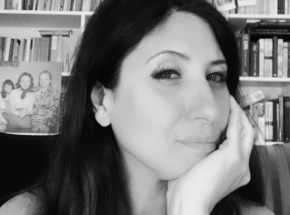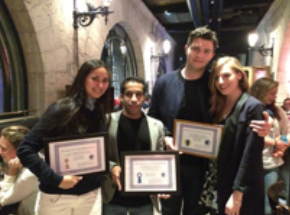
- About AUP
- History of AUP
- Mission & Core Values
- Vision and Leadership
- AUP Recognition
- Alumni Success
- Campus Development
- Arts at AUP
- Policies & Guidelines
- Academics
- Undergraduate
- Graduate Programs
- MA in Diplomacy and International Law
- MA in Global Communications
- MSc in Human Rights and Data Science
- MA in International Affairs
- MA in International Affairs, Conflict Resolution, and Civil Society Development
- MSc in International Management
- MSc in Strategic Brand Management
- Find Your Thesis Advisor
- Previous Programs
- Cultural Program
- Faculty
- Summer School
- Research Centers
- The Center for Critical Democracy Studies
- The Center for Writers and Translators
- The George and Irina Schaeffer Center for the Study of Genocide, Human Rights and Conflict Prevention
- The Joy and Edward Frieman Environmental Science Center
- The Center for Media, Communication & Global Change
- Departments
- Academic Resources
- Academic Affairs
- Academic Calendar
- Academic Resource Center
- Library
- Registrar's Office
- Teaching and Learning Center
- Employer Network
- Accessibility & Accommodation Services
- Quai D'Orsay Learning Commons
- Paris as Classroom
- ACE Center
- Admissions
- Student Life
- Campus
- Get Involved
- Paris
- Support Services
- Student Development Help Desk
- Student Accounting Services
- Student Immigration Services
- Student Grievance Procedure
- Accessibility at AUP
- Diversity and Inclusion
- Health & Well-being
- Digital Student Handbook
- News
- Events
- AUP Giving
- Housing Offer for 2024-2025
- Housing | Spring 2024
- IRIS Project
- IT Services
- Alumni
- About AUP
- History of AUP
- Mission & Core Values
- Vision and Leadership
- AUP Recognition
- Alumni Success
- Campus Development
- Arts at AUP
- Policies & Guidelines
- Academics
- Undergraduate
- Graduate Programs
- MA in Diplomacy and International Law
- MA in Global Communications
- MSc in Human Rights and Data Science
- MA in International Affairs
- MA in International Affairs, Conflict Resolution, and Civil Society Development
- MSc in International Management
- MSc in Strategic Brand Management
- Find Your Thesis Advisor
- Previous Programs
- Cultural Program
- Faculty
- Summer School
- Research Centers
- The Center for Critical Democracy Studies
- The Center for Writers and Translators
- The George and Irina Schaeffer Center for the Study of Genocide, Human Rights and Conflict Prevention
- The Joy and Edward Frieman Environmental Science Center
- The Center for Media, Communication & Global Change
- Departments
- Academic Resources
- Academic Affairs
- Academic Calendar
- Academic Resource Center
- Library
- Registrar's Office
- Teaching and Learning Center
- Employer Network
- Accessibility & Accommodation Services
- Quai D'Orsay Learning Commons
- Paris as Classroom
- ACE Center
- Admissions
- Student Life
- Campus
- Get Involved
- Paris
- Support Services
- Health & Well-being
- Digital Student Handbook
- News
- Events
- AUP Giving
- Housing Offer for 2024-2025
- Housing | Spring 2024
- IRIS Project
- IT Services
- Alumni
Related Links
Alumni
Culinary Diplomacy: Charles Duque ’93 and the Connective Business of Food
Home>Academics>Undergraduate>Majors & Minors>
For Charles Duque, the food industry is a powerful platform to bridge cultures and shape socioeconomic landscapes around the world. A global food executive for French dairy products, Duque promotes more than butter, cream, and cheese. With a sense of diplomacy woven throughout his life and culinary career, he also champions receptivity to new ideas, proficiency in languages (he speaks four), and cultural exchange. In his current role as Managing Director for the Americas at CNIEL, the French Dairy Interbranch Organization, he impacts every aspect of the dairy industry while serving as an ambassador for French cuisine and using food to forge global connections.
Duque’s cosmopolitan outlook began early. He grew up in North Bergen, NJ, just across the Hudson River from the cultural melting pot of New York City. Duque’s parents are Colombian and spoke Spanish at home in a dual-culture household. He traveled widely in Mexico, Latin America, and Canada, and studied French in high school, which came naturally to him, to such an extent that during a class trip to France, he began to envision a future there. “I said to myself, ‘one day you'll live here’.”
Indeed, Duque would move to Paris at the age of 20 and enroll at AUP. While studying international business he also worked at a travel agency, which provided him with broader exposure to the world and ignited an organic relationship with France that continues to serve him. “It allowed me to get to know the different nuances in French society. You don't learn that in school. You have to live it.” After graduation, Duque interned at L’Oréal—the first American to do so.
With his open mind and palate, and surrounded by France’s renowned cuisine, Duque’s path to a career in food emerged organically. “Food is present in all our lives. It’s something we all need and can appreciate. Living abroad broadened my horizons to taste new flavors and recipes and textures that were foreign to me, and opened my eyes to a whole new cuisine. I’ll eat anything…at least I’ll try it.”
Duque’s voracious curiosity and strong connection to France manifest in the breadth of his professional experiences. After AUP he returned to New York and worked at the revered house of caviar Petrossian, where his fluency in French facilitated his transition from operations to luxury sales. Subsequently, he opened the US subsidiary of premier French chocolatier Richart in San Francisco, and spearheaded US communications campaigns promoting the French tradition of the apéritif in the US for the food and beverage agency Sopexa. At one point, Duque tried to get out of the food business; as he was passionate about air travel, he spent a short period of time working for Finnair, the Finnish national airline, which led him to embrace yet another culture. He delved into Finnish food (including reindeer and goose), experienced saunas, and took trips to the North Pole to build relationships with tour operators and travel agencies. The food industry, however, would not let him go so easily. Duque made a notable return as the Director of the AgroTech Division at Business France, the French Trade Office. Providing strategic guidance on branding and business development, he helped over 500 French exporters successfully introduce their products to the US market. In this role he also began promoting cheese, and “renewed the tie” that he always wanted to keep with France. In recognition of his work, the French Republic awarded Duque with the Order of Agricultural Merit.
Now, at CNIEL, Duque represents the entire French dairy chain, including farmers, cooperatives, and processors, and builds connections to buyers in the US, Canada, and Latin America. All these constituencies have “different expectations of their world,” Duque says, and his sense of diplomacy is key. His constant travel has led him to be able to articulate the nuances of cheese palates around the world: in Colombia, for example, fresh, mild cheeses such as brie and camembert taste exceptionally strong, “and forget about Roquefort,” he adds – though it’s popular in Asia, with its spicier, umami-driven flavors.
“I'm promoting products that help people earn a livelihood, that come from a good place, that are good for you, that have a story behind them,” says Duque. “Food for me is a great vector for work or to talk about things. It's a convivial way to reach out and to touch people.”
Related
-

Selin Atasoy ’95
Alumna
Read MoreSelin Atasoy ’95
Alumna
Being at AUP and in Paris allowed me to explore different aspects of life, fields of education and subjects of interest.
-

Donna AlSudairi ’11
Alumna
Read MoreDonna AlSudairi ’11
Alumna
AUP was exactly what I was looking for: a liberal arts university in the center of Paris, with a diverse student population.
-

Business Integration Capstone
Featured Course
Read MoreBusiness Integration Capstone
Featured Course
Features a complex international business simulation that integrates material students have covered throughout their studies.

